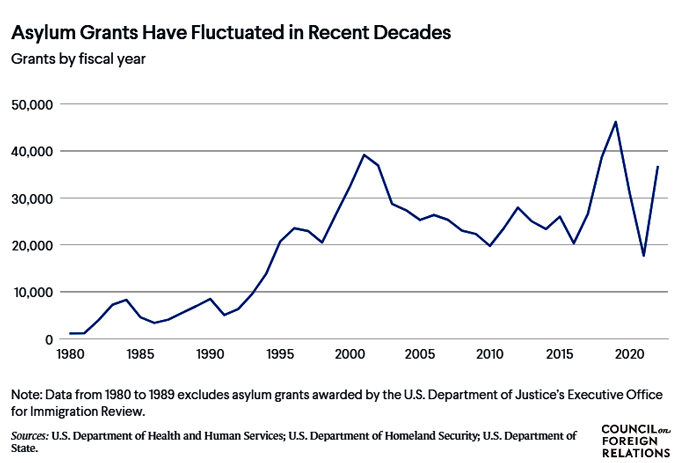 |
Looking out from Hell Town tonight... |
 |
|
January 20, 2025: In Washinton, D.C., Donald Trump is inaugurated as 47th President of the United States; in Florida, Hell freezes over. Residents of The Sunshine State watched slack-jawed as temps plummeted and a record snowfall fell on the heads of some of its unluckiest citizens. Most of those heads reside in the western Panhandle. Almost 10 inches of the white stuff landed on Milton, just northeast of Pensacola. Winner and still champ. The state's previous record snowfall, of 4 inches, also was set in Milton, in 1958. Florida's ice box. |
|
5/27/25 -- "If At First You Don't Succeed, Lower Your Expectations."*
He seemed just the kind of huge imago to head up the President's novel concept of a "Department of Government Efficiency." DOGE would be the uber cost-cutter that would offset the cost of extending Trump's 2017 TCJA "tax relief for the rich" program that has pretty much demonstrably proved it was never going to pay for itself as its boosters were guaranteeing back at the time of passage.
A clearly brilliant technologist and the savviest of businessmen, Musk is a CEO and founder of not one but several of the country's most admired (you know, there's nothing in life like a good publicist) technology companies. Whose business career had made him "the richest man in the world." A certified strategist, an acknowledged branding guru, and a cost cutter and pursuer of operational fraud, waste and abuse par excellence. He'd just cleaned up and thoroughly refocused the highly popular but poorly run social network, Twitter, and in jig time, too. He was an unstoppable force in everything from electric car design to space rocketry. Why not government?
There is one regard which might make him an odd choice, or at least one out of character for Donald Trump. Musk was a one-time Barack Obama-backer, who had suggested as late as 2022 that our then ex-president should "hang up his hat & sail into the sunset." In the 2024 GOP primary contest, Musk supported the candidacy of Florida Gov. Ron DeSantis. Such a character quirk is generally fatal in Trump World, but in the presence of such intellect, business success and, well, money, bygones surely could be considered bygones.
Plus, there was this: Musk had offered up more than $250 million of his money to help Mr. Trump, and other GOP candidates win their elections in 2024, (much of it through Musk's America PAC). Trump floated the idea of a Musk-led "government efficiency commission" (DOGE) during the later months of the campaign, an external body that would offer "advice and guidance," in a notably more limited role than the one Musk would assume. DOGE would, in the fullness of time, take on a life of its own, for a little while anyway.
Ahead of Election Day 2024, Elon Musk said he was confident he could uncover ways to cut “at least $2 trillion” from the federal budget if Americans elected the Republican ticket.
Just two months following the election, however, Musk was already walking that original projection back. He told political strategist Mark Penn in an interview that his $2 trillion figure was actually just a “best-case outcome” and that he thought a more likely outcome would be half of his original goal.
Why? Perhaps because it was quickly becoming clear the DOGE assault had a few things not working for it. A lot of the things Musk and his merry band of "DOGE kids," (software engineers aged between 19 and 24 without prior government experience) were doing were likely in violation of federal law, specifically the constitutionally established separation of powers principles. At least that's what multitudinous lawsuits asserted, from affected groups of federal employees, watchdog organizations like the ACLU, labor unions, advocacy groups and state attorneys general. These are still working their way through the system, but already a number of DOGE actions have been stopped or even reversed as a result of appeals in local and federal courts.
And then, Musk's ruthless and often arbitrary and even uninformed approach toward picking the targets of his Department of Government Efficiency assaults—characterized by the metaphoric spectacle of the Tesla CEO brandishing a chainsaw on stage before a salivating crowd—revolted more moderate public support even as it lubricated the flow of lawsuits, with pushback from federal workers and even Tesla owners and investors.
If Musk was essentially planning to follow the approach he took in reshaping Twitter's workforce and culture, he was going to run into a problem business analysts like to call "scale." Twitter when he took it over was a relatively small and narrowly focused company, with 7,500 employees, most of them working in a fairly narrowly defined field doing very similar things: managing a single social media platform. His strategy in a nutshell was to change the entire corporate mission and culture by literally throwing out the old ones.
But Twitter is a speed boat; the federal government is the entire naval fleet. In fact, the naval fleet is just one part of the federal government. It is vast, with nearly 3 million employees not counting the post office or the armed forces, and they're distributed all over. And the mission is incredibly complex. Our country's operations have a direct impact on the lives of billions of people in the United States and around the world every single day.
And unlike the case with Twitter, Musk didn't buy the federal government. He's just a consultant. CNN notes that within hours of acquiring Twitter, Musk had fired all its top executives; within days, he’d laid off around 3,500 employees, around 50% of the company’s total staff; and ultimately, he dismissed 80% of the workforce. He demanded everyone remaining to forget about working from home and told them if they wanted to stick around they should plan on putting in up to 80 hours a week. That kind of autocratic bull-in-a-china-shop style was never likely to work with the federal government. Either Musk, his people or their enablers—probably all three—had read too much into their mandate. The Federal government is just not constructed to work that way. Being a genius with one doesn't make him a genius with the other.
And anyway, who says what Musk did with Twitter (now rebranded "X") was really pure genius at work? While the labor force and earnings performance have both rebounded somewhat since 2023, the reimagined enterprise is considerably smaller and less successful than previously. The rebranded company literally doesn't try to do as many things as it used to. It can't. It lacks the manpower. That would not be really an option for federal employees. Their terms of employment as well as their work goals and work styles are in many cases dictated by the needs of its publics, the strictures of federal law, as established in legislation passed by Congress. And in some cases strictures made by labor union contracts as well.
A study conducted by Edison Research concludes that X experienced a 30% drop in customer usage from 2023 to 2024. Moreover, it found that only 19% of the U.S. population reported using the platform in 2024, down from 27% in the previous two years. X lost nearly one-fifth of its U.S. daily active user base, with a similar downward trend in the UK and EU. According to analysts, it appears like X will continue its decline in 2025. Emarketer reports that from the time Musk acquired X in 2022 until 2025, they believe X to have lost 7 million monthly active users in the U.S.
The declining user base was compounded by the decline of X's brand and value. According to a recent report from Brand Finance, X's brand is now worth $673 million, a significant drop from the $5.7 billion figure before Musk's takeover. X's revenue fell by 40% when compared to the prior year based on internal company data from June 2024.
X's revenue is projected to grow in 2025, and the company is improving its financial position. But it is still navigating some challenges, including a substantial debt burden and the ongoing evolution of its business model. X's 2024 revenue is estimated to be around $2.6 billion, which is well below the $5.1 billion Twitter generated in 2021 before Musk's acquisition. (X is a private company now and does not have to release detailed financial reports publicly.)
But perhaps the biggest problem the men (and women) of DOGE faced was that from the start they were precluded from working on total spending, which in 2024 was about $68 trillion. Federal spending is approximately 25% of the total U.S. economy, by the way; but surely you could squeeze a trillion or two out of that.
Here's some rough round figures for you to conjure. Mandatory spending was off the table. That includes Social Security, Medicare, and Medicaid. Changes to those programs would (or at least should) require Congressional action. That would be, at $41 trillion, almost two thirds of all spending. Musk and co. also couldn't touch interest paid on the national debt. That's another 11% of total spending out of their reach at $7 trillion.
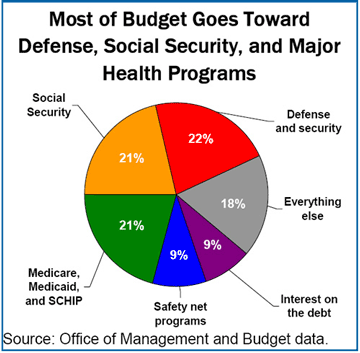
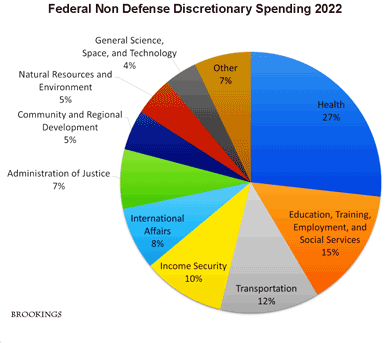
The rest is called discretionary spending. Stuff Congress approves on a year-to-year basis. about 26% of total spending or $17.5 trillion. But DOGE couldn't even have at all of that either. Defense spending is in that category, and obviously no one had any mandate for cutting that. Indeed, the President and most of the Republicans in Congress want to increase it. That's another 13% of the total or just shy of $9 trillion.
It bears noting that in 1973, discretionary spending amounted to 9.6% of GDP, with about 60% of that for defense. Today, discretionary spending is 6.6% of GDP. A little under half of that goes to defense (Brookings).
So, for the most part they were kidding themselves all along? Well, yeah. And kidding us too.
But one thing the once and future President knew was that he couldn't sell the 'ole "it'll pay for itself" line of malarkey this time around. The line its boosters were peddling back in 2017. Hence the need for Musk and his DOGE boys. The actual per annum cost of renewing his cherished (not by him but by the people he promised it to back in 2016) tax deal is about $500 billion. That's the hit Federal tax receipts would take, each year and every year, and that's the number he actually needed Musk to hit. And that is what doesn't look like it's going to happen. (One is inclined to suspect that at least some of the appeal of his tariff machinations is that they'll squeeze additional tax revenues out of an unsuspecting public but it won't be seen as income tax revenues. The Lord giveth and the Lord taketh away.)
For some fun reading from your recent past: "Did billionaires pay off Republicans for passing the Trump tax bill?" (The Center for Public Integrity, February 7, 2019) (Link here.) Be sure to share with your Republican friends.
(Postscript: another kick at the can.) The President's critics (that would be the Democrats, and oh, Rand Paul) worry his 2025 "Big Beautiful Bill," for all its "cost cutting," will only compound the budget woes. Supposedly it would actually add anywhere from $2.5 to $5 trillion to the national debt (over ten years or so: the larger figure from the Congressional Budget Office). Swallowing Musk's meager savings whole. Interest on the debt has more than tripled since 2017.
As for Donald Trump? He couldn't give a fig about the national debt. He'll be gone by the time those numbers show up. Trump's futuristic thinking doesn't extend much beyond the next Nobel Peace Prize award announcement. (Another unrequited desire of Trump's, which if he was counting on capturing by settling the Ukraine War may also, like Wile E. Coyote, be sinking out of view.)
But as to Musk and his Quixotic dreams, in retrospect maybe a super genius was not what was really needed in this situation after all, or maybe it's just that real super geniuses are like cops in a way.
We are like sheep without a shepherd We don't know how to be alone So we wander 'round this desert Wind up following the wrong gods home But the flock cries out for another And they keep answering that bell One more starry-eyed Messiah Meets a violent farewell Don Henley and Stan Lynch, "Learn to Be Still"
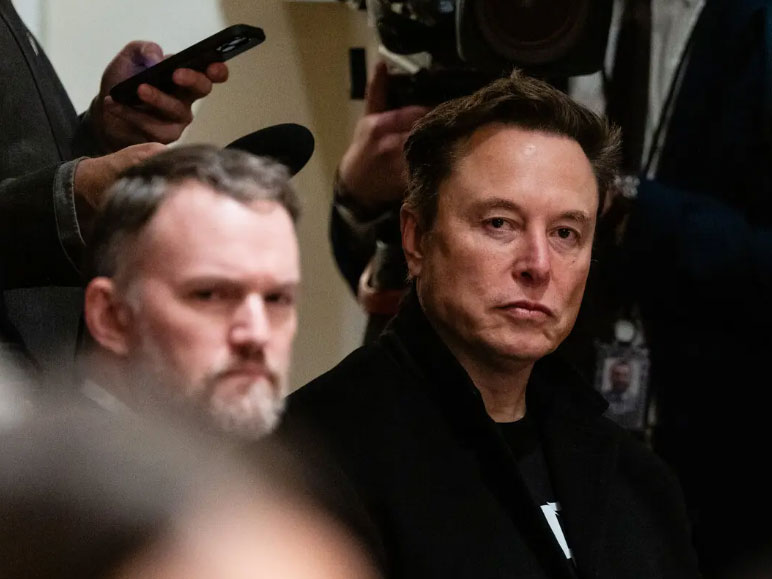
4/5/25 -- "Everything You’re Doing is Bad. I Want You to Know This."*
We should be so lucky. One wonders if he harbors the same ill feeling towards his local grocers, who sell him all kind of stuff, and never buy anything back from him. They would no doubt be horrified to learn that he did. They thought everything they did together was an even swap: food for money. If you don’t think you’re getting good value, the best thing to do is shop elsewhere, where maybe they’ll give you more food in exchange for the same or even less money.
Unless of course you’re hung up on quality, which makes balancing the equation a little more complicated. But that is the essence of shopping, is it not? You know: your own personal shot at mastering the “Art of the Deal,” as it were?
But Trump wants to insist that America has been in steep decline, oh say, ever since the 1960s, when he was approaching puberty and when, in his febrile memory, America was a great manufacturing power. Which it was. What he's lost sight of is everything that's happened since.
Fareed Zakaria in a recent Washington Post opinion describes the President's state of mind thusly: https://www.cnn.com/2025/04/06/politics/video/gps0406-tariffs-trump-economy-american-decline
The notion of imposing tariffs to revitalize manufacturing jobs that have long been outsourced to low-wage countries flies in the face of reason. New factories would take years to plan and build. And when done, they would probably, what with advanced automation, complex computer systems and robotics, require mostly the kind of low-paying jobs that the traditional American laborer long ago moved on from. America has become a land of tight labor markets and well-paid workers.
And besides, who says America gave up manufacturing anyway? Trump?
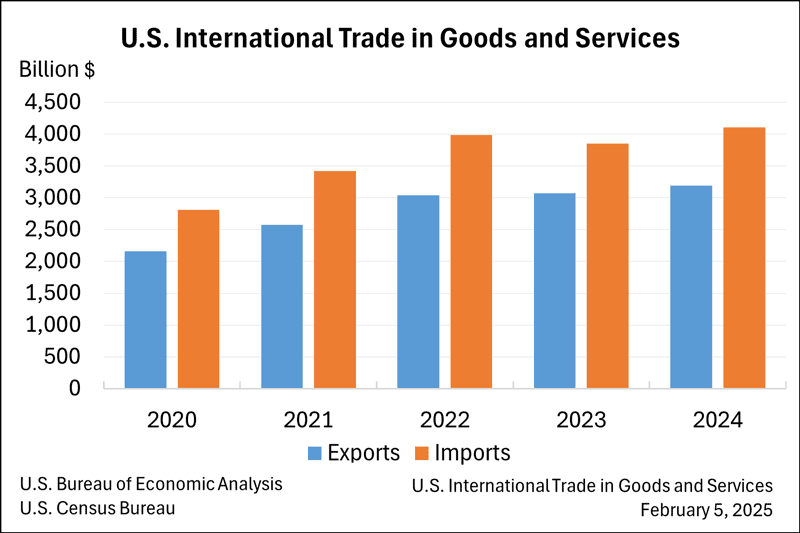
The U.S. Census Bureau and the U.S. Bureau of Economic Analysis reported that for 2024, the goods and services deficit was $918.4 billion, (up $133.5 billion from $784.9 billion in 2023). This reflected an increase in the goods deficit of $148.5 billion, or 14.0 percent, to $1,211.7 billion and an increase in the services surplus of $14.9 billion, or 5.4 percent, to $293.3 billion. Whew. Lot of numbers.
The U.S. remains the second largest manufacturing nation in the world, behind only China, which with a huge population and low labor costs, still makes a lot of things US manufacturers gave up on years ago, in order to capitalize on their own technological advantages and concentrate on producing things and stuff offering a greater ROI. (Think transportation equipment ($252B), Chemicals ($174B), Computers and Electronic Products ($116B) and non-electric machinery ($109B). Or advanced military aircraft, media and entertainment, aerospace and defense, accounting and legal services, high- end computer systems, computer programming, software development, etc. etc. etc.
In 2018 the Brookings Institute reported that manufacturing constituted 27% of China’s overall national output, and it accounted for 20 percent of the world’s overall manufacturing output. In the United States, manufacturing represented 12% of the nation’s output and 18% of the world’s capacity. In Japan, manufacturing was 19% of the country’s national output and 10% of the world total. Fun fact: overall, China, the United States, and Japan comprise nearly half of the world’s manufacturing output.
| Country | Share of Global Output |
|---|---|
| China | 31.6% |
| United States | 15.9% |
| Japan | 6.5% |
| Germany | 4.8% |
| India | 2.9% |
| South Korea | 2.7% |
| Russia | 1.8% |
| Italy | 1.8% |
| Mexico | 1.7% |
| France | 1.6% |
source: World Population Review (2024 statistics)
Zakaria notes Trump’s nostalgic worldview is rooted even further back than the 1960s. "He looks fondly on the late 19th century, when ... the United States had only tariffs and no income tax, and America was stronger economically than it has ever been compared with the rest of the world. This history is nonsense. In 1900, the United States accounted for about 16% of the global economy by one measure; it is now about 26% of it. Americans’ standards of living and health are much higher today."
In fact, in the last three decades, as Zakaria points out, "the U.S. economy has surged ahead of all its major competitors." Its economy has grown to twice the size of the Euro-zone. U.S. wages are 40% higher. Mississippi, the poorest state in the Union today has a higher per capita GDP than Britain, France or Japan.
Let it also be noted that, contrary to Trump’s stubborn beliefs, the United States is somewhat protectionist itself, with tariff and nontariff trade barriers greater than those of 68 other countries. With Trump's new tariffs, American protectionism will go off the charts, with higher rates than the Smoot-Hawley ones of 1930 that exacerbated the Great Depression.
The Cato Institute recently urged followers to, “Ignore the Politicians: Trade Deficits Don’t Really Matter.” Cato is not some squishy woke leftie pinko think tank. They are libertarian in their policy positions, typically advocating diminished government intervention in domestic, social, and economic policies and decreased military and political intervention worldwide.
“There is no rational economic reason,” Cato says, “why Americans should be expected to sell exactly the same value of goods and services to people in a particular foreign nation that they buy from them.”
For instance, The U.S. is almost always going to run a trade deficit with Canada. We have more buyers: 300 million Americans versus 40 million Canadians. Theirs is a big country (more landmass -- at least paradoxically when you include bodies of water-- than the U.S.) but with a small population. Canada does run trade deficits with countries outside the United States. (Ironically, they just ran an overall trade deficit in February 2025, hardly typical.)
Canada is America’s single largest market by a large margin. We sent nearly US$350 billion in goods and services across Canada’s border in the first three quarters of 2024. Some 34 U.S. states sell more goods to Canada than any other foreign economy. Why would we want to go and tick them off?
In The Wealth of Nations, founding father of modern economics Adam Smith advises, “In every country it always is and must be the interest of the great body of the people to buy whatever they want of those who sell it cheapest. The proposition is so very manifest that it seems ridiculous to take any pains to prove it; nor could it ever have been called in question had not the interested sophistry of merchants and manufacturers confounded the common sense of mankind.”
If there are special situations (with Russia, for example), they are so by virtue of values and priorities outside of economics, such as national security. You might well want to make an exception for weapons of war or militarized computer chips. But for things like automotive engine blocks or high-fashion evening wear or miniature plastic umbrellas for garnishing tropical cocktails, it’s purely caveat emptor. No need to confine their production to the homeland.
Trade deficits or surpluses will always occur and will vary by product and from country to country. But there is little point in paying them much mind. If it still really bothers you, commit to buying less. Most Americans feel like they don't need to resort to that. Because we're richer than everybody else. We can buy what we want.
Should the U.S. be on guard for trade cheats and seek to flush them out, even leaning on them to change their ways? Sure. That would be systematic. But that is not the Trumpian way. His way is to try and blow the whole world up and then rummage through the wreckage to see if there's anything worth salvaging, anything he might want to pick up. A lot of collateral damage that way. The frogs do not die in sport, Donny.
So there, now you have a better overview of the subject than seven out of ten of your closest friends and relatives, and it’s certainly more than your President picked up in his four years at Fordham and U. Penn. And you didn’t even have to do research or write any term papers, but then the odds are good he didn’t either.
| Region | 1970 | 1980 | 1990 | 2000 | 2007 | 2011 |
|---|---|---|---|---|---|---|
| Developed Countries (U.S., Europe, Japan) | 26.8% | 23.9% | 20.7% | 16.9% | 14.3% | 12.8% |
| East Asia (China and South Korea) | 13.9 | 22.5 | 24.3 | 20.9 | 21.2 | 21.5 |
| Southeast Asia (Indonesia, Malaysia, Philippines, Thailand) | 11.4 | 14.4 | 15.6 | 16.3 | 15.4 | 14.0 |
| India | 9.4 | 9.1 | 10.5 | 11.4 | 11.9 | 11.6 |
| Latin America | 15.5 | 15.4 | 15.3 | 13.2 | 12.4 | 11.5 |
| North Africa | 12.6 | 13.8 | 14.4 | 14.0 | 12.9 | 11.9 |
| Sub-Saharan Africa | 5.8 | 7.2 | 8.3 | 8.3 | 8.6 | 8.4 |
source: The Brookings Institution
10/31/24 -- Trick or Treat
 Happy Halloween! Click here for Sammy's annual Halloween message to his grown children. "They would not listen, they're not listening still. Perhaps they never will."
Happy Halloween! Click here for Sammy's annual Halloween message to his grown children. "They would not listen, they're not listening still. Perhaps they never will."
10/28/24 --Donald Trump's Fabulous Tales of Presidency cont.
Myth #2: “The most secure border in US history”
A perfect place for reality to meet up with Donald Trump, no? In early 2021, the former President issued possibly his first post-presidential statement, saying, "We proudly handed the Biden administration the most secure border in history. All they had to do was keep this smooth-running system on autopilot.” His sentiments were seized upon by MAGA acolytes who quickly made it a favored talking point. Do they give themselves too much credit?
The United States is home to more foreign-born residents than any other country in the world. In 2022, immigrants composed almost 14% of the U.S. population. The U.S./Mexico border encompasses 1,954 miles of terrain ranging from desert to urban sprawl. It spans four states and about 26 land Ports of Entry. It is the most traversed border in the world with over 350 million documented crossings every year. And it has always known trouble.
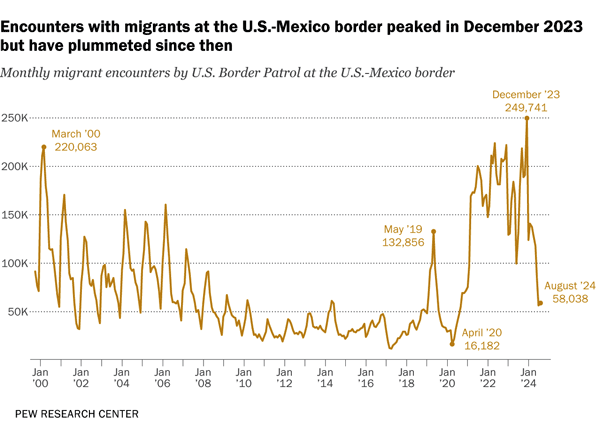
Just how perfect did Trump leave the border for his successor, really? And if he left it in such tip-top shape, however did it fall apart so fast and so furiously? Like in minutes.
First off: "autopilot?" "There is no such thing as 'autopilot' in immigration," observes Susan Martin, an immigration expert at Georgetown University. She points out each new administration has to examine the lessons of the election and the expectations of voters as well as current conditions, new legal rulings and the shifting situation at the border itself.
And then, what exactly does "most secure border" even mean? What are we measuring here? Trump's earliest references to border security related to building a border wall. Securing the southern border with a barrier was the signature promise of his election campaign. Or he could have been thinking about personal safety when he made that boast. He frequently characterized the border as a lawless place. (Kind of ironic.) In January 2018, he tweeted: "We must have Security at our VERY DANGEROUS SOUTHERN BORDER, and we must have a great WALL to help protect us...." But in time he has seemed to come to see security as more the whole package rather than just "the wall."
To professionals in the border businesss, security means keeping people and contraband we don't want coming into the country out, and in fairness the Trump administration set an unprecedented pace for executive action on limiting incoming of all kinds.
President Trump framed asylum seekers as a national security threat. First, he instituted travel bans on most Muslim nations (later struck down in court), and then he implemented policies intended to increase prosecutions of undocumented migrants. And he announced new limitations on asylum protections for migrants fleeing domestic abuse or gang violence.
He launched the Migrant Protection Protocols, also known as the “Remain in Mexico” program, which required migrants to wait in Mexico while their immigration cases were processed in U.S. courts. His administration revivified Title 42, previously a rarely used public health law on the books from 1944 as part of the Public Health Service Act, to deny asylum on pandemic-related grounds.
According to the Cato Institute, President Trump was actually more successful in limiting legal immigration than the illegal kind. He actually entered the White House with an announced goal of reducing legal immigration by 63%, and by November 2020, the number of green cards issued to people abroad was down by at least 418,453 and the number of non-immigrant visas by at least 11,178,668.
To critics, his goal of eliminating illegal immigration turned instead into a virtual collapse of interior immigration enforcement. Homeland Security Secretary Alejandro Mayorkas told ABC This Week, "The entire system under United States law that has been in place throughout administrations of both parties was dismantled in its entirety by the Trump administration."
Action at the Southwest border fluctuated over Trump's term in office. In fiscal 2017 the number of encounters was 303,916, the lowest since fiscal year 1971, according to Customs and Border Patrol (CBP) records. Which did indeed lead the Department of Homeland Security to boast that "the southwest land border is more difficult to illegally cross today than ever before."
Fiscal years 2018 and 2019 saw sizable increases in apprehensions, to 396,579 and 851,508 respectively. The highest figures in nearly a decade (still lower than during George W. Bush's administration. In 2000, the number of apprehensions from Border Patrol had reached 1.6 million.)
In 2019, according to Customs and Border Patrol, the number of total enforcement actions (from Border Patrol and the Office of Field Operations), including the deportation of people deemed inadmissible under asylum laws, surpassed 1.1 million. This number decreased, however, by nearly 500,000 in the following fiscal year.
Trump did not sign the Presidential Determination on Refugee Admissions for 2020, which sets the refugee admissions target for the upcoming fiscal year, until November 2019, so no refugees at all could be admitted in October, the first month of the new fiscal year.
Refugee admissions and asylum applications in 2020 were obviously affected by COVID-19-related travel restrictions and the temporary closures of U.S. Citizenship and Immigration Services. United States Citizenship and Immigration Services field and asylum offices were closed to the public from March 18 through June 3, 2020 and reopened in phases. Thus, refugee admissions dropped 98% between February and April 2020 and remained at historic lows through July before rebounding to levels similar to those observed in 2019 in the last two months of the fiscal year.
In fiscal 2021 southwest border encounters increased to their highest recorded level. The Border Patrol reported 1,659,206 encounters with migrants at the U.S.-Mexico border, narrowly exceeding the prior highs of 1,643,679 in 2000 and 1,615,844 in 1986.
The large number of encounters in fiscal 2021 dwarfed the total during the last major wave of migration at the southwest border, which occurred in fiscal 2019. The Border Patrol recorded 851,508 encounters that year.
All told, the Trump administration enacted 472 administrative changes that dismantled or reconstructed many elements of the U.S. immigration system. Humanitarian protections were diminished, the border became more closed off and legal immigration became out of reach for many. This was done nearly exclusively by the executive branch, through proclamations and executive orders, departmental policy guidance, and multitudinous small, technical adjustments.
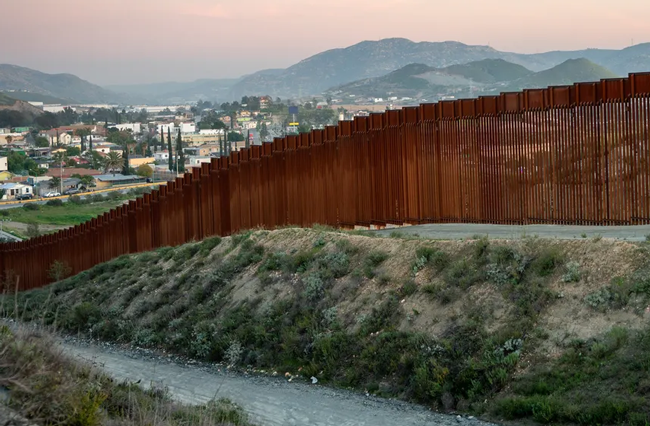
The cost was an estimated $15 billion, which came not from Mexico but from Department of Defense funds and appropriations from Congress. Combined with fencing that pre-dated Trump's presidency, about 700 miles—mostly along public land in Arizona and New Mexico—now have a barrier. Which does not seem to deter migrants.
Border Patrol have acknowledged that the towering bollards have served a purpose but that professional smugglers and determined migrants have found myriad ways to get through and over the wall. Saws and power tools were used to cut holes in it more than 3,200 times between 2019 and 2021, requiring $2.6 million in repairs. From October 2021 to September 2022, the wall was breached 4,101 times, an average of about 11 breaches per day. Some smugglers have essentially created "doors" in the wall. Smugglers have also dug tunnels or climbed over the barrier on ladders, or crossed at one of the wall's many gaps. Paths built by construction crews now guide migrants making it across.
The wall has made crossing the border more dangerous. Migrants circumventing the wall have drowned swimming across the Rio Grande and collapsed from heat exposure in the desert. Some climbing over the wall with ladders or by hand have fallen as much as 30 feet, suffering severe injuries—some fatal. In fiscal year 2022, at least 853 migrants died crossing the border. Border Patrol also recorded about 22,000 rescues of distressed migrants, up 72% from the previous year. In 2021, the United Nations-affiliated International Organization for Migration named the U.S.- Mexico border "the deadliest land crossing in the world."
By December 2019, 57,000 migrants had been returned to Mexico. Human Rights First found that at least 636 of those became victims of violent crimes in Mexico, including kidnapping, rape, torture, and assault. As of September 2019, fewer than 10,000 migrants in the program had seen their cases reviewed. 11 had been granted asylum; 5,085 cases were denied; and 4,471 cases were dismissed without being evaluated, often on procedural grounds.
On July 15, 2019, the Department of Homeland Security and the Department of Justice had announced an interim final rule that declared that foreigners who crossed the US–Mexico border were ineligible for asylum unless they had previously applied for asylum in countries they had traveled through. This effectively barred asylum claims on the border from nationals of Central America and Cuba.
The American Civil Liberties Union launched a court challenge. Judge Timothy Kelly of the DC District Court upheld the new rule. The same day Judge Jon Tigar of the Northern California District Court issued a preliminary injunction against the rule, halting its implementation until the legal matters could be resolved. In September 2019, the U.S. Supreme Court stayed an injunction against the rule in Barr v. East Bay Sanctuary Covenant, allowing the rule to take effect while legal challenges were pending.
In March 4, 2020, the Ninth Circuit Court of Appeals ordered "Remain in Mexico" halted in the states under its jurisdiction. On March 11, 2020, the U.S. Supreme Court allowed the Trump administration to continue the program while litigation continued.
In February 2021, the Biden administration ended the policy, resuming admission of new asylum seekers, and the approximately 25,000 with pending cases, into the United States. In August 2021, a federal judge in Texas ordered a resumption of the Trump-era border. He ruled the reversal may have violated the Administrative Procedure Act, which prevents arbitrary regulations. A stay to block reinforcement was denied by both the Fifth Circuit Court of Appeals and the U.S. Supreme Court, compelling the administration to reinstitute the policy.
In December 2021, the administration announced they had agreed to requirements by Mexico for the resumption of returns, including COVID-19 vaccination, completion of cases within 180 days, and inquiries into fears of return to Mexico. After completion of negotiations with the Mexican government, the Biden administration announced the resumption of the practice, with some alterations. But then, on June 30, 2022, the U.S. Supreme Court ruled in Biden v. Texas that the Biden administration had the authority to end the policy. But then, in February 2023, Mexico's Ministry of Foreign Affairs announced it would reject any efforts to reinstate the policy. Whew.

Title 42 allowed U.S. officials to turn away migrants at the border and deny them the right to seek asylum on the grounds of preventing the spread of COVID-19. It first took effect in March 2020 and ended on May 11, 2023. During that period U.S. officials turned away migrants more than 2.8 million times. Families and children traveling alone were exempt. It was a rarely used section of the U.S. Code that dated back to 1944 that empowered federal health authorities to prohibit migrants from entering the country if it is determined that doing so could prevent the spread of contagious diseases.
The CDC invoked Title 42 at the beginning of the U.S. outbreak, in March 2020, giving Border Patrol agents the authority to swiftly expel migrants trying to enter the U.S. instead of allowing them to seek asylum within the country, as had long been the policy. Migrants expelled from the U.S. under Title 42 are returned to their home country or most recent transit country. Part of the rationale for invoking Title 42 was to avoid holding migrants in crowded U.S. immigration facilities when the highly transmissible coronavirus was spreading. But some advocates, elected officials and others criticized the policy as more of an effort to restrict immigration to the U.S. than a public health strategy.
It bears noting there were no real consequences when someone illegally crossed the border. So the same migrants were able to try again and again to cross, on the off chance they would get into the U.S. While the number of encounters was its highest on record in fiscal year 2023, the number of individuals encountered was considerably lower. More than a quarter of all migrant encounters at U.S. borders in both fiscal 2021 and fiscal 2020 (27% and 26%, respectively) involved repeat crossers.
President Joe Biden initially kept Title 42 in place after he took office, then tried to end its use in 2022. Republicans sued, arguing the restrictions were necessary for border security. Courts kept the rules in place. But the Biden administration announced in January that it was ending national COVID-19 emergencies, and the border restrictions then naturally went away.
Over the course of time, the federal government separated and detained more than 3,000 children, housing many of them in chain-link cages in temporary facilities along the border. DHS detained children sometimes for far longer than the 72 hours allowed by law, and then transferred them to the custody of the Department of Health and Human Services, which kept the children in tent cities.
The indefinite detention of minors violated the 1997 Flores Settlement Agreement, which limits how long immigrant children can be detained. Public outcry led to a June 2018 executive order with which President Trump officially ended the family-separation initiative and instructed DHS to house children with their parents in existing facilities.
In January 2019, the inspector general of the Department of Health and Human Services found that the number of separated children who were referred to the department’s Office of Refugee Resettlement had increased significantly as early as the summer of 2017—well before the announcement of the zero-tolerance policy. When a federal judge ordered the Trump administration to begin reuniting the families it had separated, it became clear that there was no method to track both parent and child as they moved through the system. In April 2019, the government admitted in court documents that the process to reunite families could take up to two years. Some five years on, some 648 children had still not managed to reunite with their parents.
Decades-long data from CBP suggest apprehensions along the Southwest border have increased steadily from 1960 on. That year, the total number of encounters from Border Patrol was 21,022. The number hit a high in 1986 with 1,615,844. It then dipped again, before peeking again in FY 2000. Apprehensions are actually on a generally downward trend since the mid-2000s.
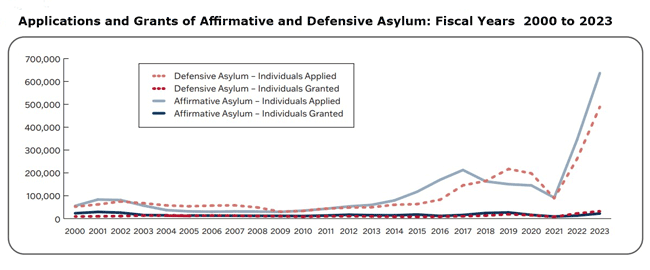
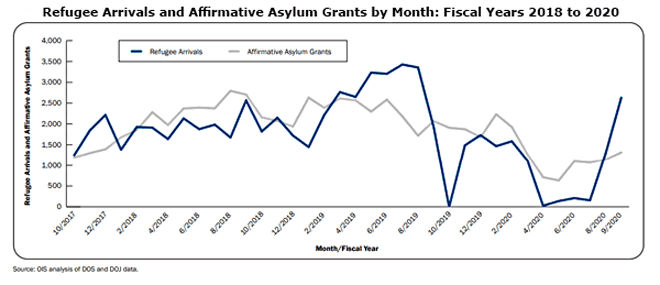
Under President Biden unauthorized crossings at the southern border have indeed hit a record high. They averaged 2 million per year from 2021 to 2023. Crossings dropped in the spring and summer of 2024 after the administration tightened border controls and closed off migrants’ access to the asylum system. But apprehensions still exceeded 1.3 million during the first nine months of the 2024 fiscal year.
Biden tried working with Congress in 2023 to give the immigration system a much needed legislative overall, but a majority of Republican lawmakers, at Donald Trump's behest, in the end chose not to move forward with a Republican-led Senate $118 billion border bill.
Once Vice President Kamala Harris became the Democratic candidate for president, former President Donald Trump was inclined to shift ownership of the border from Biden to her, insisting that as the assigned "Border Czar" she would be the one who personally turned the whole thing into a disaster through mismanagement and abdication.
Good for a stump speech, but not even some parts of this plaint were remotely correct. A lot to unpack here. Get comfortable.
Whatever you make of the situation at the southern border, the responsibility for managing it still belongs to U.S. Customs and Border Protection and U.S. Immigration and Customs Enforcement. Those two government entities both report up to the President, through two cabinet positions, the Head of the Department of Homeland Security and the Secretary of Health and Human Services, about as one would expect. And by the way, they both think they're doing a much better job of it than you do, and under conditions made unnecessarily difficult by the United States Congress. Ironic, no? You'd think they'd all be on the same side.
But Harris was never named "border czar," not evenly informally, and she was never responsible for overseeing U.S. border enforcement. It has become a very popular criticisms among Republicans, but it wasn't the border Biden put Harris in charge of. Her critics may want to resist believing that, some with all their heart and soul, but it's true.
Vice President Harris was tasked with the rather narrow, albeit somewhat daunting in its own right, challenge of researching the root causes of migration, specifically from the so-called Northern Triangle countries of Guatemala, Honduras and El Salvador. She was to explore ways the U.S. and those countries' governments might cooperatively address the mushrooming problem of the day: too many people dying to get in here. Any way to keep them home?
In short it was a diplomatic assignment, not a managerial post. Biden asked Harris "to be the chief diplomatic officer with Central American countries" and try to identify what was prompting so many of their citizens to leave their home countries to come to the United States.
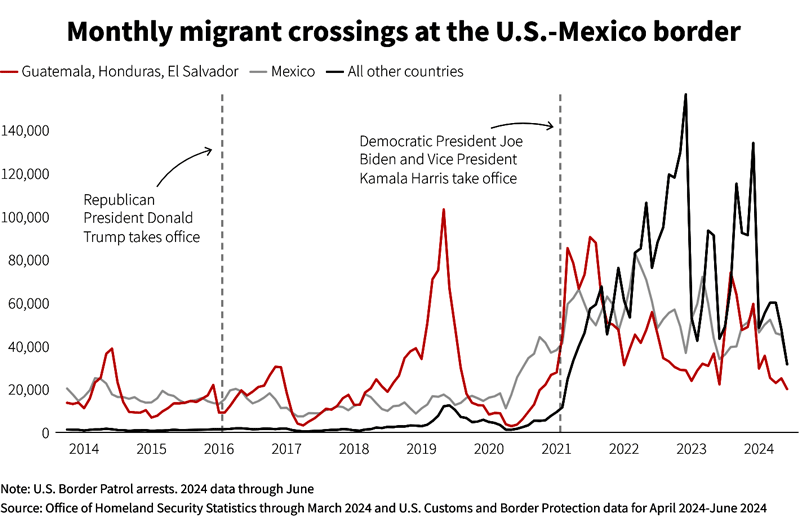
And as soon as she settled in, border crossings, already fast-growing, started ratcheting up to dizzying levels, spurred primarily by a whole bunch of migrants from, notably, outside the region she was even studying. (See chart.)
When Donald Trump first descended down that golden escalator to announce his candidacy for the presidency in 2015 , he was already fighting the previous immigrant war. The true target of his scorching invective need not have even been the Mexicans. Rapidly changing dynamics—coupled with outdated immigration laws and infrastructure—had already metastasized into a recipe for disaster. Presidents Obama (once called "the great deporter"), Trump and Biden in their time all faced a not-really seen-before border crisis.
Once in office, Trump wasn't solving the border; he was just another White House occupant struggling to keep up with a problem growing far faster than government's abilities to deal with it. Our current situation traces its roots to 2014, when rival gangs in Central America started forcing families and unaccompanied kids to flee their historical homes at unprecedented levels. Continued violence pushed even more families and teens into northern Mexico during the Trump presidency, with a notable surge in 2019.
During both Trump's and Biden's presidency, the pandemic and its aftermath, other global crises and evolving smuggling networks began pushing migrants to the border from South America and beyond, even from the Ukraine and China.
The right to seek asylum was incorporated in international law following the atrocities of World War II. The 1951 Refugee Convention and its 1967 Protocol provides the internationally recognized definition of a refugee and outlines the legal protection, rights and assistance a refugee is entitled to receive.
The Office of the High Commissioner for Refugees was established by the General Assembly of the United Nations in 1950 to help the millions of people who had lost their homes fleeing conflict and persecution. The U.S. Congress adopted key provisions of the Refugee Convention (including the international definition of a refugee) into U.S. immigration law when it passed the Refugee Act of 1980.
A person granted asylum is protected from being returned to his or her home country, is authorized to work in the United States, may apply for a Social Security card, may request permission to travel overseas, and can petition to bring family members to the United States. "Asylees" may also be eligible for some government programs, like Medicaid or Refugee Medical Assistance. That's the law.
After one year, an "asylee" may apply for lawful permanent resident status (i.e., a green card). Once individuals become permanent residents, they must wait four years to apply for citizenship.
Asylum was granted in about 40% of the nearly 700,000 asylum cases that have been decided since 2000. Immigration judges in that timeframe approved about 30% of the applications, or about 420,000 cases, filed by people in deportation proceedings after arriving at the border or after being apprehended within the U.S.
In fiscal year 2022, immigration judges decided 52,000 asylum cases; about 46% of claimants were granted asylum. The approval rate was closer to 39% for those who applied as a defense against deportation.
As to the rest, under Biden, the U.S. has expelled, removed or returned people out of the U.S. around 3.8 million times, according to Department of Homeland Security data. By comparison, 1.5 million deportations were carried out while President Donald Trump was in office. Those were in addition to the 3 million migrant expulsions that occurred under the pandemic-era Title 42 order between March 2020 and May 2023—the vast majority of which occurred under the Biden administration. Combining deportations with expulsions and other actions to block migrants without permission to enter the United States, the Biden administration’s nearly 4.4 million "repatriations" are more than any single presidential term since the George W. Bush administration (5 million in its second term).
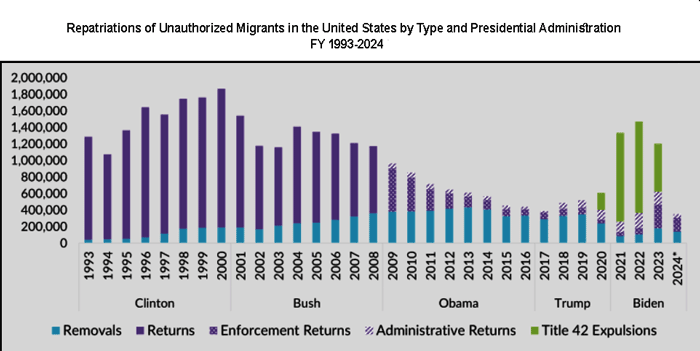
Migration is not a free-standing phenomenon. It responds to wider forces: economics, political instability, policy decisions, even climate change. As these forces change, they could generate new hordes of migrants. They're not pouring in because there's a new guy in the White House or because more people are being indiscrimninately slip into the country.
Knowledgable observers agree there is only so much the White House can do on its own. Ultimately, it is up to Congress. They need to pass legislation to overhaul a crowded, inefficient immigration system. Instead of more crackdowns generating only temporary results, the U.S. government needs to overhaul border security and immigration systems that continue to fall behind the numbers of migrants seeking protection and a new start. New money and manpower are needed for the processing of asylum claims at the border, the management of cases while asylum seekers await trial, and the efficient adjudication of those cases. A system that dedicates fewer than 725 judges to a backlog of 3 million cases is nonsensical.
The U.S. government needs to invest in an immigration and asylum system that is faster, fairer, and more humane. The situation at the border is not a crisis, it’s an administrative problem
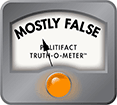
PolitiFact has dismissed Donald Trump’s “most secure border in US history,” claim as “Mostly False.” It's perplexing that more Americans aren't doing the same.
9/27/24 -- Opinions Vary
I'm Donald J. Trump and I approve this message”
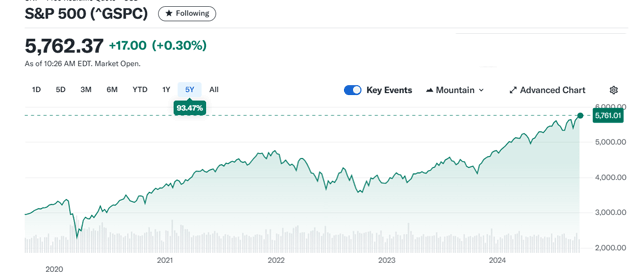
US stocks jumped, as investors welcomed a slew of updates, including solid US economic data and upbeat earnings reports. The Dow Jones Industrial Average rose 0.62%, while the S&P 500 added 0.4% to close at another record high.
[On Sept. 18, the Federal Reserve Bank reduced interest rates by a half-percentage point, signaling confidence that strength in the labor market would be maintained in a context of moderate growth and inflation moving sustainably down to 2%. Asked whether the U.S. economy faced the prospect of a recession, Fed Chair Jerome H. Powell told reporters, “I don’t see anything in the economy right now that suggests the likelihood of a recession. You see growth at a solid rate, you see inflation coming down, and you see a labor market that’s still at very solid levels.”]
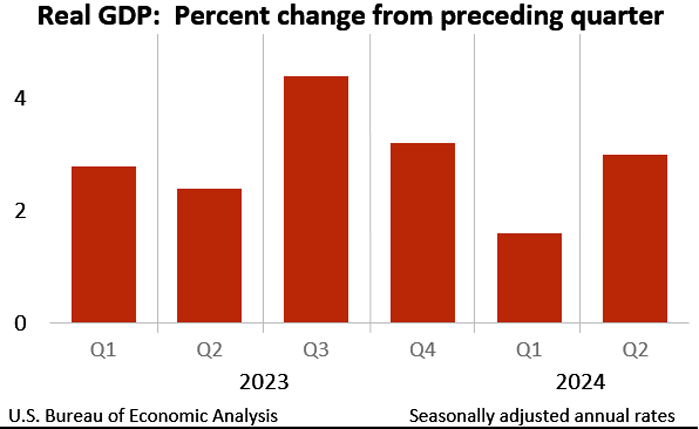
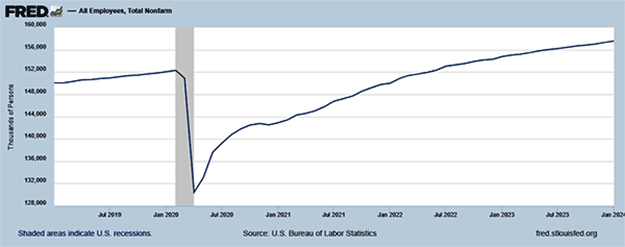
7/31/24 -- Donald Trump's Fabulous Tales of Presidency
Myth #1: “The greatest economy in the history of the world”
The "best economy" claim was one of a litany of spurious brags Trump made in his debate with President Biden, and is one which he made as well in his first (2020) presidential debate with then-candidate Biden in Cleveland. He flaunted the same claim in a Facebook post October 5, 2021. And has flogged it at his rallies dozens of time since.
The way economists generally evaluate the size and strength of an economy is by charting its rate of growth. And the way they generally do that is with something called Gross Domestic Product (GDP). The Bureau of Economic Analysis (BEA), an agency of the Department of Commerce, produces official macroeconomic and industry statistics including reports about the gross domestic product (GDP) of the United States and its various units—states, cities, towns, counties, and metropolitan areas. BEA has about 500 employees and an annual budget of approximately $101 million.
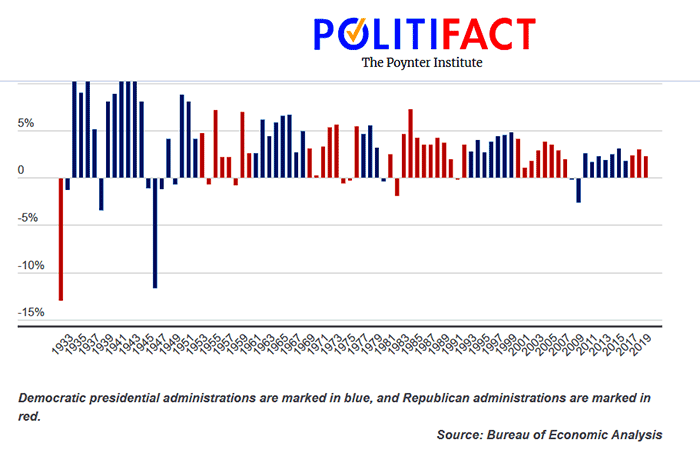
Quarterly and annual GDP readings are the most popular way to measure how a president is managing the economy during his term of office. And economic policies are one of the main issues that presidential candidates harp on when running for office. But it should be noted that while the president plays an important role in guiding the economy, external factors such as wars, recessions or, say, public health crises significantly impact economic progress and can be out of a president’s control. Moreover, the Federal Reserve—an independent arm of the federal government—sets monetary policy, which also greatly influences GDP performance. (Ask Trump about COVID, ask Biden about interest rates.)
Even before COVID, not just GDP but other metrics such as wages and business investment under Trump were at best on par with what previous presidents turned in, or even below. In point of fact, annual increases in GDP under Trump were broadly similar to what they were during the final six years under his predecessor, Barack Obama. And all this is a part of the public record. So whence the "greatest economy" boast?
Trump did score, so to speak, two economic milestones during his four years in the White House. In the third quarter of 2020, GDP surged at what would ordinarily be a stunning 33.1% annualized rate. The President, predictably, was quick to celebrate: “Biggest and Best in the History of our Country, and not even close. Next year will be FANTASTIC!!!” he wrote on Twitter.
First of all, it's well to bear in mind that quarterly GDP growth is an artificial construct. It multiplies quarterly gain or loss by four in order to produce a picture of what a whole year at that rate would like.
Second, celebrating this particular moment was akin to telling half a story. Immediately leading up to that “milestone” measure, the second quarter had declined at a 31.4% annualized rate — the deepest downturn on record.
In other words, the US posted record growth in one period because it posted a record decline in the period prior. In fact, the US economy was still operating well below its pre-pandemic peak and GDP was still $670 billion lower than where it was at the end of 2019.
But a timing reference in the Trump Facebook post dated October 5, 2021, suggests he could be thinking of the other "record" achievement of his term of office. Unemployment in September 2019 plunged to 3.5%, a level it hadn’t touched since the early 1950s. It was essentially the lowest peacetime unemployment rate over a three-year period, going back to the Great Depression, according to Gary Burtless, an economist with the Brookings Institution.
Trump's Facebook post read “In case you forgot. Two years ago today (emphasis added), we were experiencing the greatest economy in the history of the world.”
That "two years ago" time reference fits pretty well with the September 2019 report date. Could Trump be confusing unemployment with GDP, or simply deciding on his own that the former was a more flattering indicator of his economic achievement than the latter? Why not, if it suits his purposes? He’s told bigger lies than that.
But in all honesty, this was an accomplishment that would need to be shared anyway. Trump benefited greatly from the continuation of trends already well in place from the Obama “Great Recession” recovery. (Nor would Trump sustain it for long. By the following April, with COVID, it had mushroomed to 14.8%)
"While Trump can take some credit, I see it like the relief pitcher who comes in during the 9th inning with a seven-run lead, then boasts about winning the game," Dean Baker, co-founder of the liberal Center for Economic and Policy Research, told PolitiFact. "It’s fine to get some credit for holding the lead, but this is much more an Obama story than a Trump story."
(The rate dropped later to 3.4% under Biden in January 2023. Currently it sits at 4.1%) No, Donald Trump didn’t lead ‘greatest economy in the history of the world’
But the fact remains that growth in the nation’s gross domestic product (GDP) is the key tool to gauge an economy's performance, and that was just so-so on Trump’s watch. And all the former President can really claim with respect to GDP is that he achieved the second strongest growth record of all presidents in the second decade of the twenty-first century (2011-2020).

PolitiFact has twice dismissed The Donald’s “greatest economy,” claim in a one-word judgement, as “False.”
6/20/24 --"Lies and the Lying Liars Who Tell Them"*
Washington Post fact-checkers, who were keeping track from the beginning, documented 30,573 false or misleading claims during Trump's presidential term, an average of about 21 per day.
"All Presidents lie. It’s a basic fact of American government," author Bill Lueders began a book review he wrote for The Progressive Magazine. some years back. The book in question was Eric Alterman's Lying in State: Why Presidents Lie, and Why Trump Is Worse. According to Alterman the tradition dates back to Thomas Jefferson who lied publicly about the true purpose of the Lewis and Clark expedition, which was not primarily scientific as claimed but meant to scope out the West for acquisition.
Alterman recounts how FDR feigned reticence about entering World War II. And how Truman falsely described Hiroshima, a civilian center targeted for atomic devastation, as a “military base.” Dwight Eisenhower lied about U.S. spy flights over Russia and got caught when Soviet premier Nikita Khrushchev produced a downed pilot. John F. Kennedy lied about the Cuban missile crisis. Lyndon Johnson lied about Vietnam, in particular the imaginary Gulf of Tonkin attack that gave license to the war.
And evidently about whatever else came into his mind as well. Of Lyndon B. Johnson, Robert Kennedy, Sr., (no fan of his brother's successor) once said: "He just lies continually about everything. He lies even when he doesn't have to lie." Johnson's persistent dissembling about the Vietnam War envenomed American political life to the point that journalists coined a euphemistic term for the disconnect: the credibility gap. Which in time was what brought his administration's tenure to an early and disreputable end.
Johnson's successor, Richard Nixon, ran for office pledging to bring an "honorable" end to the carnage in Vietnam, before expanding the conflict by secretly carpet-bombing neutral Cambodia. Then for Nixon, of course, there was Watergate.
When Saddam Hussein invaded Kuwait in August 1990 and US troops were rapidly scrambling to the Gulf, some segments of the American public appeared to be less than completely sold on the justification for military action. Jude Sheerin writing on the Broadcasting Corp.'s website recounts the following tale.
The Kuwaiti government-in-exile hired a US public relations firm, Hill & Knowlton, whose Washington DC office was run by (President George H.W.) Bush's former chief of staff.
The PR firm coached a purported witness, introduced as a 15-year-old girl called "Nayirah," to tearfully testify to US Congressmen, in October 1990, that Iraqi soldiers had entered a hospital in Kuwait, removed babies from incubators and left them to die on the cold floor. Nayirah, reporters were assured, was using an assumed name for fear of reprisals against her family back home. Only after the war would it emerge she was the daughter of Kuwait's ambassador to the US and her story was completely baseless. Remember the movie "Wag the Dog" with Dustin Hoffman and Robert DeNiro (also Anne Heche and a hilarious cameo by Woody Harrelson)? President Bush is recorded as having publicly touted this tall tale at least six times as he blew the bugle of war.
Leuders's book review observes that presidential lies are generally propagated to serve one of a small number of ends. Some are deemed necessary or at least justified to advance specific strategic or tactical goals, others are aimed, regrettably, at self-serving or opportunistic purposes, or worse, intended to conceal corruption. And then some were just downright pathological, as the title of Alderman's book suggests.
The German philosopher Immanuel Kant regarded any lie as immoral—even one told to a murderer at the door. Kant saw lying as overriding the autonomous will of another person, unacceptably reducing that person to a mere tool. Modern-day philosophers are a little more inclined to allow exceptions to such rigidity, citing, for example, when using deception for achieving a critical political goal.
An article in the website The Conversation (an online "Ezine" posted by an independent news organization) recounts the story of how Abraham Lincoln, while himself open to the idea of pursuing peace negotiations with the Confederacy, knew that much of his own party believed unconditional surrender by the South was the only acceptable path to settling the slavery issue. Lincoln wrote a note to his own party asserting—falsely—that there were “no peace commissioners” being sent to conference with the Confederacy. A member of Congress later allowed that, in the absence of that note, the 13th Amendment—which ended the practice of chattel slavery—would never have been passed.
In that same article The Conversation suggests that Trump tends to lie in a slightly different way, the pathological one. "What is striking about his lies ... is that they have tended to be told to defend his own self-image or political viability rather than in service of some central political good." And one might add, they are never-ending.
The article further opines that some of President Trump’s more implausible lies can be best understood as tests of loyalty; those in his circle who repeat his most obvious lies demonstrate their loyalty in doing so. Most recently, he has attacked as disloyal members of the Republican Party who have not repeated his ,um, trumped up claims about electoral fraud.
But pathology aside, self-serving tactics have occasionally been employed by presidents credited with far more probity than Trump (or Clinton). In 1983, President Ronald Reagan claimed he had filmed atrocities of the Nazi death camps while serving as a US Army Signal Corps photographer in Europe. Supposedly he told this story to Israeli Prime Minister Yitzhak Shamir at the White House. But in fact, Reagan never left America during World War Two.
Even the Father of our Country was not above self-justifying mendacity in weaker moments. In 1788, Washington attempted to rewrite history by claiming he had been the strategic visionary behind the victory over the British at Yorktown seven years earlier, which effectively ended the Revolutionary War. But it was actually his French allies, specifically Rochambeau and Lafayette, who masterminded the decisive battle in Virginia. Washington had been stubbornly arguing instead for an attack on New York City.
The original sin, if you will, of presidential duplicity.
The CNN news clip that introduces this post is a fact-checking analysis of a Trump rally in Wisconsin. It was held the weekend before the first (and maybe last) Presidential debate between Joe Biden and Donald Trump. It counted thirty fabrications, misrepresentations and distortions made in a soaring Trumpian flight into a make-believe where one need only need wish to make it so. Do people really believe him when he does these things? Does he even care? Are parallel universes just part of the show?
The fact-checking was the work of Daniel Dale, a reporter in CNN's Washington Bureau who specializes in assessing politicians' claims. He has since produced a similar report on the Presidential debate as well. (It can be viewed at CNN's website if the reader is hungry for more.)
The litany of claims, criticisms and assorted fantasies Trump delivered at the Presidential debate was quite similar to what he offered in Milwaukee, only a little longer and with the stunned countenance of the current President for added visual effect. It was an affair where Biden seemed surprisingly weighted down by old age and creeping perplexity and Trump seemed unusually untethered from reality.
The Biden people could hardly claim they couldn't foresee what their man would be up against. They'd have done better to just skip any effort to give voice to Biden's own future vision or recent accomplishments. And steer his entire narration toward taking the hot out of the hot air in Trump's more mind-exploding pretensions.
They could have made it simple by just schooling the President in five or six key contradictory rebuttals, and doing it over and over, to the point where he'd be able to deliver them in his sleep. Which judging from his level of alertness at the Atlanta disaster, might just be what he'd have to be able to do.
Coming up next here: a series of future posts, with small words, each addressing one specific instance of the former President's litany of louche claims and improbable reveries. Relatively short: to the point, briefly documented, simply illustrated. Watch your in-box. Copies will go to Camp David too. Even if it turns out someone else gets to take Joe's place, being Democrats it's likely they'd be able to use them too.
This shouldn't be that hard. All you have to do is convince people you're not Donald Trump. Or someone worse.
2/24/24 -- "I faced it all, and I stood tall and did it my way."
|
Annual CPAC Conference Vice Presidential Straw Poll
Gaylord Nat'l Resort & Convention Center, Fort Washington, MD Feb. 24
Polling was conducted by McLaughlin & Assoc. Ballots were submitted by 1,478 conference participants. A separate presidential poll was won by Donald Trump with 94% of the vote with Nikki Haley receiving 5%.
|
2/21/24 -- Historians' Presidents Day Survey
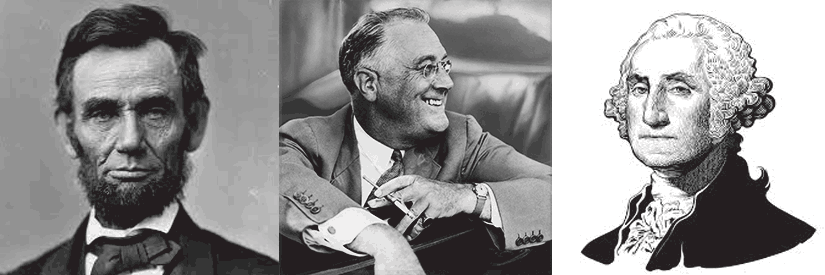
Recent professional interest in rating U.S. presidents dates from the Arthur M. Schlesinger, Sr., poll of 1948. Schlesinger solicited the opinions of fifty-five "experts," the majority of whom were professional historians. The findings were subsequently published in Life magazine and were quickly embraced by the press as representing the collective judgment of historians everywhere. Schlesinger repeated the exercise fourteen years later, this time surveying seventy-five experts.
In both those polls the top five ranking presidents were Abraham Lincoln, George Washington, Franklin D. Roosevelt, Woodrow Wilson, and Thomas Jefferson. The bottom two were Ulysses S. Grant and Warren G. Harding.
Respondents to this year’s survey included current and recent members of the Presidents & Executive Politics Section of the American Political Science Association as well as scholars who had recently published peer-reviewed academic research in key related scholarly journals or academic presses. 525 respondents were invited to participate, and 154 usable responses were received, yielding a 29.3% response rate.
On the survey's 0-100 scale of "overall greatness," a rating of 50 means a president was average, while zero means a president is considered a failure. Only the top three presidents — Abraham Lincoln at No. 1, followed by Franklin D. Roosevelt and then George Washington — scored above 90. The drop-off was sharp from there, with no one else above an 80 rating. Roughly half the presidents were rated below 50.
The results of this year’s ranking are similar to the results from previous surveys. Abraham Lincoln again tops the list (95.03 average), followed by Franklin Delano Roosevelt (90.83), George Washington (90.32), Teddy Roosevelt (78.58), Thomas Jefferson (77.53), Harry Truman (75.34), Barack Obama (73.8), and Dwight Eisenhower (73.73).
The most notable changes in this ordering are Franklin Delano Roosevelt moving up to #2 from the third spot last year, and Dwight Eisenhower falling back to #8 from #6 last year. The bottom of the rankings is also relatively stable. Donald Trump rates lowest (10.92), behind James Buchanan (16.71), Andrew Johnson (21.56), Franklin Pierce (24.6), William Henry Harrison (26.01), and Warren Harding (27.76).
"While partisanship and ideology don't tend to make a major difference overall, there are a few distinctions worth noting," said political scientists Brandon Rottinghaus of the University of Houston and Justin S. Vaughn of Coastal Carolina University, who managed this year's survey as those in 2015 and 2018. “Experts who self-identified as conservatives rated President Joe Biden No. 30, while liberals put him 13th and moderates ranked him 20th. All three of those same groups ranked Donald Trump, whose presidency was marked by his flouting of historical norms, in the bottom five.”
"There are also other president assessments where partisan polarization is evident — Reagan, George H.W. Bush, Obama, and Biden — but interestingly not for Bill Clinton," the survey's authors said.
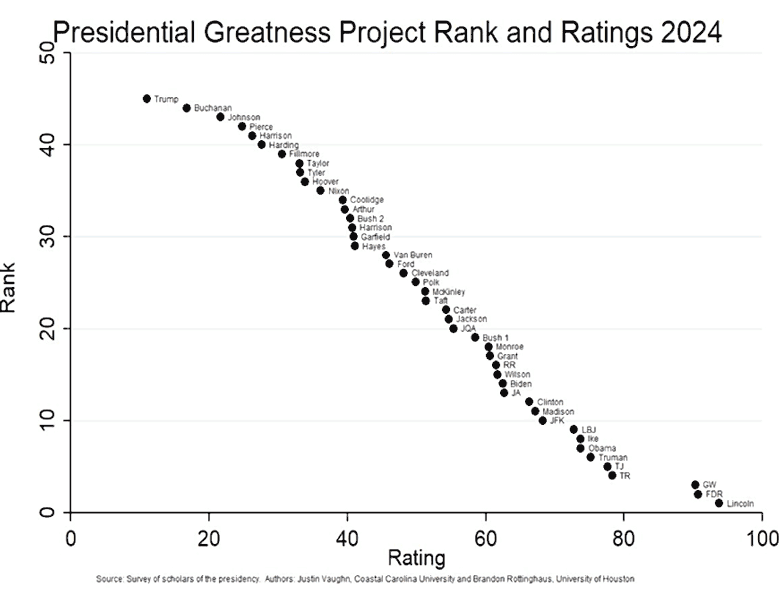 Thirsty for more? The following two links are for, respectively, the NPR news posting describing the survey ("In historians' Presidents Day survey, Biden vs. Trump is not a close call") and a white paper by the survey directors ("Official Results of the 2024 Presidential Greatness Project Expert Survey") which includes the ratings and rankings for all 45 presidents.
Thirsty for more? The following two links are for, respectively, the NPR news posting describing the survey ("In historians' Presidents Day survey, Biden vs. Trump is not a close call") and a white paper by the survey directors ("Official Results of the 2024 Presidential Greatness Project Expert Survey") which includes the ratings and rankings for all 45 presidents.
